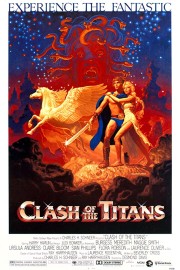Clash of the Titans (’81)
**In a rare occasion, when I upgraded Sonic Cinema back in 2015, my review for 1981’s “Clash of the Titans,” written in 2010, was lost in the shuffle. As a result, I’m having to rewatch it for the sake of writing a new review. It’s hard to be mad, however, as I find myself rewatching “Clash of the Titans.”**
If you remember nothing else from Desmond Davis’s “Clash of the Titans,” it is quite possible that you remember the scene where Perseus (Harry Hamlin) fights Medusa, whose gaze will turn a man into stone. If that’s all you remember from the film, I don’t think anyone would get on to you about it, because it’s one of the great, iconic scenes in fantasy filmmaking and visual effects. Created by the master Ray Harryhausen, Medusa is something out of a nightmare, slithering around looking for her prey as Perseus and a couple of soldiers try and retrieve her head to stave off the Kraken. Watching it this time, watching how it unfolds, I couldn’t help but wonder if John McTiernan may have had the sequence in mind when staging the climax of “Predator,” where Arnold Schwarzenegger is going face-to-face with a dangerous alien species with plenty of tricks up its sleeve, and has to outsmart it in order to survive. The seeds of that scene are in the Medusa sequence, and both are examples of genre filmmaking at its finest.
The rest of “Clash of the Titans” is not quite as potent as the Medusa sequence, but I don’t know if it could be. Released four years after “Star Wars,” its story of heroes and villains and archetypes of good and evil in the mythological sense remains entertaining and fun, but definitely feels old-fashioned in the wake of Lucas’s space opera and its cutting-edge visual effects. That’s perfectly fine, however, as Harryhausen’s form of fantasy still has a place alongside lightsabers and Death Stars as a worthy way to spend two hours in the movie theatre for many a film fan. Besides, Harryhausen paved the way for Lucas and the work of Industrial Light & Magic, and should not be dismissed out of hand. I need to acquaint myself with his earlier work better like “Jason and the Argonauts” and “The 7th Voyage of Sinbad,” but his work remains the gold standard for stop-motion for a reason, and you see it in “Clash of the Titans.” Medusa, the Kraken, Calibos, Pegasus and other wonders in this film linger in the memory because there is a singular beauty and imagination in the way Harryhausen brings them to life. When the film was remade in 2010, of course it was going to be inferior, because there’s an impersonal touch to most CG creatures, and bigger does not always equal better. Even if you can acknowledge the artistry in CG visual effects, you can always tell whether it was done with genuine affection for the sights being created, and that comes through loud and clear in this film versus the remake. Nobody did it quite like Harryhausen, and nobody ever will.
The film is about more than just creatures, though- yes, there is a story to “Clash of the Titans,” as Beverly Cross’s screenplay picks from Greek Mythology and comes up with a compelling power struggle between the gods in the heavens (in particular, Laurence Oliver’s Zeus and Maggie Smith’s Thetis) as they put humanity in the middle of their petty power trips when Zeus punishes Thetis’s son Calibos while giving his own son, Perseus, every advantage. The whims which result in Poseidon releasing the Kraken come from anger for the way humanity treats the children of gods, and this might be my favorite part of the film, even if it comes off as silly and juvenile to think ancient gods would behave this way. It’s as hilarious as it is ridiculous, and I enjoy every second of it. Yes, Perseus’s exploits on Earth, where he wins the hand of Andromeda (Judi Bowker) is fun and the heart of the adventure, but give me more of acting titans like Oliver and Smith bickering and getting back at one another while the rest of the gods (including Jack Gwillim as Poseidon, Ursula Andress as Aphordite and Claire Bloom as Hera) look on, seemingly helpless to do anything. No wonder “Clash of the Titans” has a reputation for being campy.
Desmond Davis’s film isn’t great- some parts work better than others, Hamlin is lacking in presence as Perseus, and Harryhausen trumps everything- but there’s a reason it has stood the test of time with fans. This is visual imagination for the sake of entertainment, and Cross’s script knows how to ring potential out of predictable storytelling, because at the right time, those two converge, and come up with something special. Yes, the type of cinema “Clash of the Titans” represents was on its way out with the advent of what “Star Wars” wrought, but that doesn’t mean it couldn’t get one, last salvo in before being laid to rest. It hits its mark.










